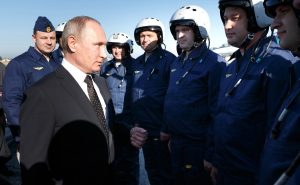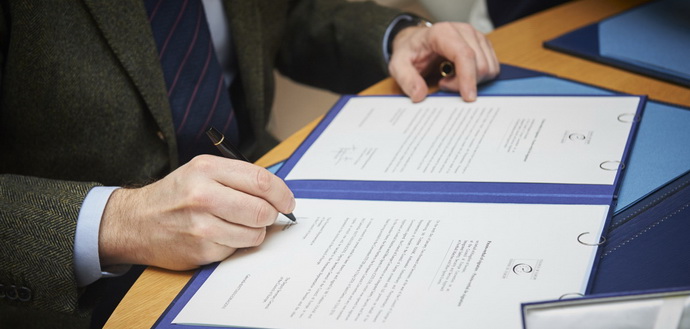The PACE Committee recently approved a draft resolution proposing a change in the Council’s Charter so that its members, even if their credentials are contested or revised, cannot be deprived of their voting rights, as well as the right to speak and the right to representation in the assembly and its different divisions. Moscow has been asked to send a delegation to participate in the June session and pay its due contributions.

In response, the head of the State Duma Committee on International Affairs, Leonid Slutskiy stated that the Russian delegation would return to PACE if, on the first day of the June session, the assembly actually approved the abovementioned proposals.
“The sanctions remain, and that’s what we were expecting. Now, it’s a question of PACE regulations... the sanctions remain, but the things that did not suit us have been dropped. From our point of view, the following cannot be applied to parliamentary delegations: deprivation of voting rights, etc.” said Slutsky.
The doors to Russia’s return to PACE were opened at a meeting in Helsinki in May 2019 by the Committee of Ministers of Foreign Affairs of the member-states of the Council of Europe. According to Finland’s Foreign Minister Timo Soini, the representatives “gave a positive political signal to resolve the Russian problem”. Russian Foreign Minister Sergey Lavrov assured his European colleagues that Moscow was not seeking to withdraw from PACE or refusing to pay its financial obligations to the Council of Europe’s budget. The Kremlin lobbyists also argue that, without Russia, PACE cannot solve many human and financial issues. Five years ago, PACE deprived the Russian delegation of its voting rights because of its occupation and annexation of Crimea and assistance in the Moscow-led war in eastern Ukraine.

The possible return of Russian delegates to PACE has caused many ambiguous reactions in the countries represented in PACE. Ukrainian, Polish, British and Baltic politicians are strongly opposed. The Kremlin seems to enjoy more favor with Berlin and Paris. However, not everything is so absolutely clear in France and Germany, as was seen during a recent seminar of the Ukrainian-Russian-European Commission - Truth, Justice, Reconciliation, which was held in Normandy within the framework of the International Peace Forum.
One of the seminar participants, Nicholas Tenzer, an expert in international relations from the Paris Institute of Political Sciences, commented on the current situation:
“As long as Russia violates the basic principles of international law and the European Convention on Human Rights, the Council of Europe must not restore its rights.
The Russian regime continues to act aggressively. We see their aggression in two regions. First of all, Syria, where Moscow not only supports the regime of Bashar al-Assad, who is responsible for crimes against humanity - 500,000 dead and 12 million displaced during the civil war, but Russia has also started committing war crimes since it stepped up its military presence in Syria from September 2015 - bombing hospitals, civilian facilities, schools, markets, etc. The Russian military uses weapons, which are prohibited against civilians, such as incendiary ammunition.”
The issue remains open, the French expert says, as to why Russia is pursuing such a policy, and why the world’s political leaders say nothing or refuse to take retaliatory measures.
“A similar situation, albeit on a smaller scale, can be seen in Ukraine. While actually participating in the war in eastern Ukraine, Russia is also responsible for the war crimes committed in the region.
More than 13,000 people have been killed in Donbas in five years of war… a war that’s three hours by plane from Paris, a war that, I’m afraid to say, most French people know nothing about because there’s no news about it in the media. To this end, mass violations of human rights, in particular the rights of the Tatar population in occupied Crimea, the unlawful imprisonment of political prisoners, including at least 70 Ukrainian citizens and 24 Ukrainian sailors detained in Kerch Strait, and systematic persecution and harassment of human rights defenders. I must underline the great courage of Russian dissidents - investigation journalists, human rights activists and environmental NGOs that sometimes disappear under mysterious circumstances, and nobody is able to find who is really behind these crimes. Cinematographers and opposition newspapers are also targets.
That’s the third category of the Kremlin’s aggressive policy. The fourth category is the Kremlin’s organization of attacks against Western democracies. I’m talking about massive meddling in the electoral process, as is the case in the United States and several European countries, including France, during the 2017 presidential election. I’m talking about the dissemination of Kremlin propaganda through both official state-owned media like Russia Today or Sputnik, and various Internet resources.”

Nicholas Tenzer believes Russia’s goal is to sow doubt, shake our democratic foundations and weaken the West’s ability to resist. It’s not about Europeans falling for Putin’s propaganda, but more about Europeans losing faith in their own system and their own ability to act. In his opinion, Putin’s regime has already won to some extent, as evidenced by the absence of reactions by Western countries:
“As long as the West continues to pursue a policy of double standards, it’s impossible to achieve an unconditional condemnation for war crimes or violations of international law committed by Russia and other states. Of course, each case must be considered separately. First of all, you need to call things by their proper names. Any crimes - Russia’s actions together with the Assad regime in Syria, Saudi Arabia’s actions in Yemen, Myanmar’s persecution of the Rohingya minority, China’s policy against dissidents and the Uighur minority - should be condemned and punished. Legal categories may be different: in one case, they’re war crimes, in another, violations of human rights, in the third case, crimes against humanity. I work mostly on Syria and disagree with the current global consensus that Russia supports the Assad regime, which is the only power to commit such war crimes. Yes, the Assad regime has committed heinous crimes, but Russia also commits them directly.”

Nicholas Tenzer says that the West must stop implementing a policy of double standards, otherwise European countries will continue to lose ground in the current hybrid war:
“We must be more consistent! It’s totally wrong to condemn Russia for its military actions in Syria and Donbas, for violating civil rights and freedoms, for interfering in elections, and, at the same time, return Russia’s voting rights in the Parliamentary Assembly of the Council of Europe, and, what’s more, continue commercial and economic relations! European leaders should speak out more often about these topics. Once again, I repeat: most French, Spanish, and Italian people don’t know that there’s a war in Ukraine that has killed thousands of people, and turned another million and a half into refugees. Everybody’s forgotten about it, because no one’s talking about it.
We also need more clarity in the terminology we use. When I talk about the Russian regime, I don’t refer to the Russian people. Moreover, when we say that Russia is hostile to our principles, our values, and international law, we shouldn’t be afraid to use the word “enemy”. What else should we call the most hostile regime in the world? We should stop using distorted discourse, as was done by former French President Francois Hollande, who at the 2016 NATO summit in Warsaw, in answer to a question about the nature of France’s relations with Russia replied that Russia was a partner, not an opponent."
Nicholas Tenzer feels that the public is confused by this ambiguous diplomatic rhetoric:
“I don’t see how the policy of so openly indulging Moscow can serve France’s national interests. On the contrary, today’s Russia represents a systemic threat to all European countries and democracy as a whole: a threat to our freedom, security, our government institutions, and our values. Russia is trying to show the world that Western values mean nothing. As we have failed to react adequately, Moscow continues to assert that the principles of liberal democracies do not function. Russia has exposed all our weaknesses.”
In his opinion, if Russia’s voting rights are returned in PACE, the West will be setting a precedent and encouraging the Kremlin’s aggressive policy.
The Russian authorities deny their direct participation in the Donbas war. In Syria, despite repeated statements by the Kremlin about the withdrawal of Russian troops, Russian military personnel are still actively deployed at the Khmeimim Air Base near Latakia, Syria. Moscow regularly reports that Russian aircraft provide active support to Assad forces in combat operations, mainly against militants from the Islamic State. Moscow has denied any involvement in aviation attacks on civilian targets or chemical attacks against the civilian population in Syria.






